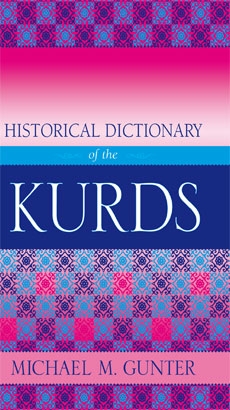
Historical dictionary of the Kurds
This historical dictionary of the Kurds contains mainly historical and political entries, with an emphasis on topics closer to the present day. Nevertheless, I have sought to include the most important earlier names and events, too. In addition, I have included a number of entries on important cultural, economic, and social topics, among others. As an aid to readers, many of the entries have extensive cross-references in boldface type. There inevitably is a certain amount of subjectivity when choosing topics for entries. Furthermore, I am sure that I have simply neglected to provide entries on topics that deserved to be included. Therefore, I welcome suggestions from readers for additional entries in any future edition.
In writing a dictionary on the Kurds in the English language, I have attempted to simplify the transliteration of names and terms as much as possible. Given the rich variety of spellings among Western scholars and the linguistic differences among the Kurds themselves, it was not possible to be completely consistent in my transliterations. Rather, I have used spellings that are most comfortable to me, an English-speaking reader and writer. Although the purist might object, the result should be that readers will be easily able to identify quickly what they are reading about.
In some cases, Kurds and those who write about them most commonly use the Kurdish term, while in others they use the English. To compound the inconsistency, Kurdish acronyms are sometimes commonly employed with full English terms. The Kurdistan Workers Party, commonly known by its Kurdish acronym, PKK, is a good example. By contrast, the Kurdistan Democratic Party (KDP) and the Patriotic Union of Kurdistan (PUK) are usually known by both their English full names and their English acronyms. Therefore, by seeking to use the terms that seem to me most common, I have not been consistent in regard to language. Nevertheless, the result is that I have used terms that readers should most easily recognize. In most entries, I have sought to use both full Kurdish and English names upon first mention. Another problem of consistency involves the birth and death years in many of the entries on persons. Because of the unsettled conditions usually prevailing in Kurdistan, even today, many Kurds simply do not know when they were born. Therefore, I have not been able to list dates for all my person entries. This problem becomes even greater for historical figures. Nevertheless, I have been able to establish the dates for a number of persons and have entered them when I could. The result is an obvious inconsistency in my entries, although they have the merit of giving as much information as they can. Again, I would welcome comments from my readers, some of whom may undoubtedly help fill in a few of the numerous gaps here... |